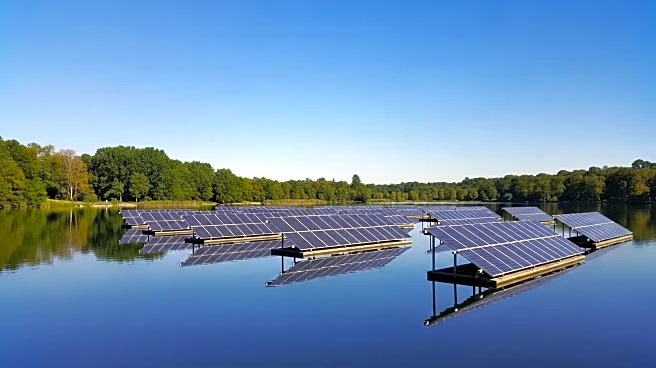What's Happening?
Noria Energy, a California-based solar firm, has initiated a new floating solar project on a water supply reservoir in Golden, Colorado. The project, known as the Aurea Solar array, is a 50-kilowatt installation that utilizes Noria's proprietary AquaPhi solar tracking system. This system enhances the efficiency of solar panels by allowing them to track the sun's movement across the sky, potentially increasing energy output by 10-20%. The project aims to demonstrate the viability of floating solar arrays in the U.S., providing a zero-emission energy source for the Consolidated Mutual Water Company while also reducing water evaporation. The initiative is part of a broader trend towards utilizing water bodies for solar energy, with other projects underway in Texas and across the U.S.
Why It's Important?
The deployment of floating solar arrays represents a significant advancement in renewable energy technology, offering a solution to land use challenges associated with traditional solar farms. By utilizing water reservoirs, these projects can conserve land for agricultural use and reduce water evaporation, addressing both energy and environmental concerns. The success of Noria's project could pave the way for larger-scale implementations, potentially transforming the energy landscape in the U.S. and contributing to the country's renewable energy goals. This approach also aligns with federal interests in preserving farmland and optimizing existing infrastructure for clean energy production.
What's Next?
If successful, Noria's project could lead to increased adoption of floating solar technology across the U.S., particularly in regions with limited land availability for solar farms. The demonstration in Colorado is expected to be operational within weeks, and similar projects are being explored in Texas, with plans to install up to 500 megawatts of floating solar panels. These initiatives could attract significant investment and drive innovation in the renewable energy sector, potentially influencing policy decisions and encouraging further research and development in floating solar technology.
Beyond the Headlines
Floating solar technology not only addresses land use and water conservation issues but also offers a unique opportunity to integrate renewable energy into existing water infrastructure. This approach could lead to new partnerships between energy companies and water management entities, fostering collaboration and innovation. Additionally, the technology's ability to enhance energy output without requiring new land development could make it an attractive option for urban areas and regions facing space constraints.









